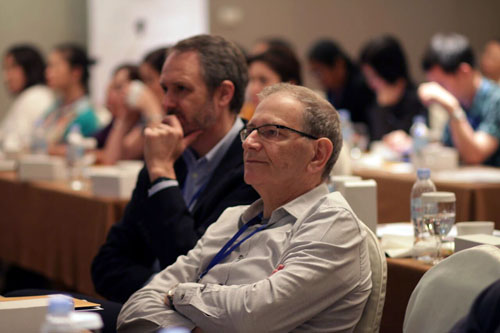
Dr. David Cooper, director of the Kirby Institute, which served as one of four international coordinating centers for the START trial
In July, the World Health Organization’s (WHO) Dr. Meg Doherty announced that the WHO would issue new HIV treatment guidelines recommending that all people living with HIV (PLHIV) initiate antiretroviral therapy (ART) as soon as possible, instead of waiting until their CD4 levels drop below 500—as recommended in the WHO’s 2013 guidelines.
The announcement, made during the International AIDS Society Conference on HIV Pathogenesis, Treatment and Prevention in Vancouver, Canada, followed the release of results from two large randomized trials—Strategic Timing of Antiretroviral Treatment (START) and TEMPRANO. Both proved conclusively that initiating ART early, before HIV begins to weaken patients’ immune systems, drastically reduces the chances of serious illness or death caused both by AIDS-defining illnesses and non-AIDS related events, such as cancer or tuberculosis. In START, the incidence of these outcomes was reduced by 57% and in TEMPRANO, by 44%.
“The new recommendation to treat all regardless of CD4 count will simplify the public health approach to HIV treatment in low- and middle-income countries,” said Dr. David Cooper, a founding member of the TREAT Asia Network and director of the Kirby Institute, which served as one of four international coordinating centers for START and contributed to the design of the study. “It will benefit patients’ personal health. And of course, there is also the added benefit of reduction in transmission to negative partners.” Research has shown that PLHIV on ART with an undetectable viral load have a significantly reduced chance of transmitting the virus.
 Dr. Sanjay Pujari, who led the Pune Institute of Infectious Diseases’ participation in STARTTEMPRANO was a seven-year-long study conducted among 2,000 patients in Cote D’Ivoire and led by the French national AIDS research agency ANRS. START, led by the International Network for Strategic Initiatives in Global HIV Trials (INSIGHT) with funding from the U.S. National Institutes of Health (NIH), involved nearly 5,000 patients at 215 clinical sites in 35 countries worldwide—including eight TREAT Asia Network sites in India, Malaysia, and Thailand. The START trial began in 2009, and results were so conclusive that it was ended this spring, a year and a half ahead of schedule.
Dr. Sanjay Pujari, who led the Pune Institute of Infectious Diseases’ participation in STARTTEMPRANO was a seven-year-long study conducted among 2,000 patients in Cote D’Ivoire and led by the French national AIDS research agency ANRS. START, led by the International Network for Strategic Initiatives in Global HIV Trials (INSIGHT) with funding from the U.S. National Institutes of Health (NIH), involved nearly 5,000 patients at 215 clinical sites in 35 countries worldwide—including eight TREAT Asia Network sites in India, Malaysia, and Thailand. The START trial began in 2009, and results were so conclusive that it was ended this spring, a year and a half ahead of schedule.
Previous studies have supported the benefits of early initiation of ART, but they were generally smaller, observational studies that did not look at early treatment’s impact on non-AIDS-related events. However, despite the new, more definitive results, obstacles to implementing the new WHO recommendation remain. Currently, only one-third of the more than five million PLHIV in the Asia-Pacific region have access to ART. Many of those not accessing treatment are undiagnosed or not enrolled in HIV clinics, and the additional cost of treating patients with higher CD4 counts could delay implementation of the new guidelines in some countries.
“Expanding provision of ART to all is going to put India’s national ART program under severe stress, and I believe it will take a while to implement this here,” says TREAT Asia Network member Dr. Sanjay Pujari, who led the Pune Institute of Infectious Diseases’ participation in START. “But I think the WHO recommendation will catalyze governments into action to improve access to ART for all PLHIV, and more importantly, it can be used as a powerful tool for advocacy to improve access worldwide.”